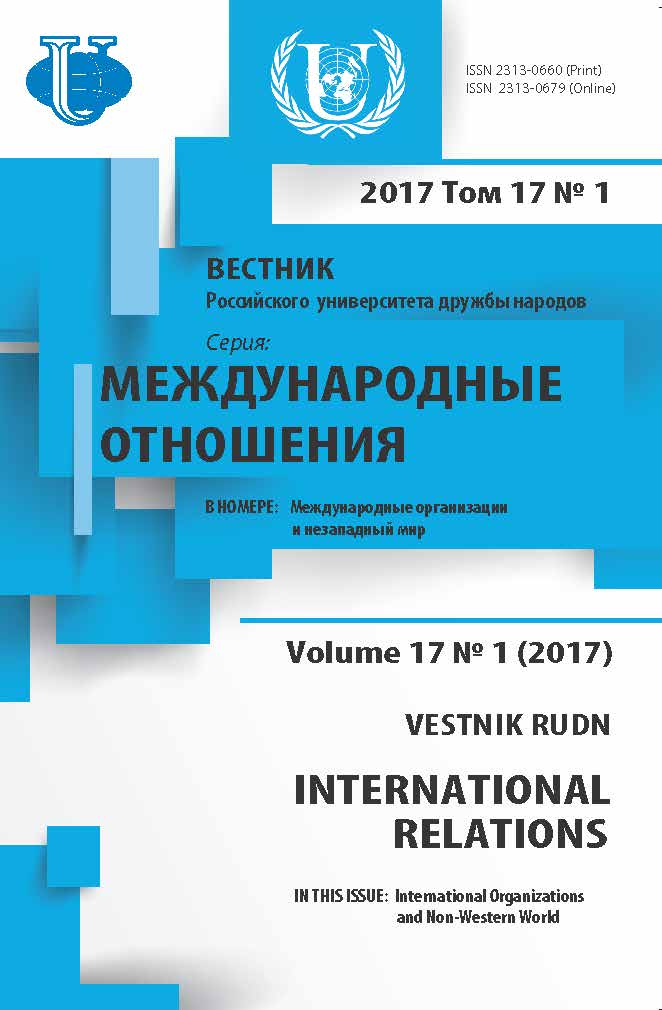International financial institutes and multipolarity challenges
- Authors: Kuznetsov A.V.1
-
Affiliations:
- Financial University under the Government of Russian Federation
- Issue: Vol 17, No 1 (2017): International organizations and Non-Western World
- Pages: 9-21
- Section: THEMATIC DOSSIER
- URL: https://journals.rudn.ru/international-relations/article/view/15873
- DOI: https://doi.org/10.22363/2313-0660-2017-17-1-9-21
Cite item
Full Text
Abstract
The world is changing, moving towards multi-polarity. However, despite the explicit shifting of the center of economic gravity from the West to the East, the dominance of the West in establishing the rules of conduct in the global economy and global finance remain virtually immutable. The author argues that the widely-discussed reform of the IMF quota and governance has not led to a significant strengthening of the role of the most dynamically developing emerging economies in the Fund’s decision-making. Regional economic players (such as the BRICS) have been actively involved in the international division of labor. However, the existence of institutional financial monopolies hinders the redistribution of global value added. Armed with the advanced information technologies and financial innovations, the leaders of financial globalization are redirecting scarce global resources in favor of the world-systemic core. The study is based on comparative methods and system analysis and aims to provide a comprehensive view on the way of involvement of global financial institutions in the control of the processes of financial globalization. US dominance in international financial institutions contribute to the further advancement of the global role of dollar as reserve currency of central banks, the currency of international settlements, deposits, loans and investments. It’s shown that the implementation of financial globalization is strongly correlated with the concept of the «center-periphery» model, on which the functioning of the global capital market is dependent. The features of the modern structure of the global currency market are summarized. The article reveals some legal aspects of global governance, in particular the role of the Anglo-American law in the global economy and global finance. It is concluded that for full participation of emerging markets, particularly the BRICS countries, in the processes of globalization, it is necessary to create a parallel financial system, aimed at the development of the real sector of the economy, which would be independent of the rules that have been established within existing system of international financial institutions.
About the authors
Aleksei Vladimirovich Kuznetsov
Financial University under the Government of Russian Federation
Author for correspondence.
Email: kuznetsov0572@mail.ru
Moscow, Russia
References
- Bazhan, A. I., & Fedorov, V. P. (2016) The dollar’s role in global governance. Bankovskoe delo, 1, 54—61. (In Russ.).
- Das, U. S., Papaioannou, M. G., & Trebesch C. (2012). Sovereign Debt Restructurings 1950—2010: Literature Survey, Data, and Stylized Facts. IMF Working Paper WP/12/203.
- Degterev, D. A. (2016a). Evaluating multipolarity of international financial system: IPE analysis. Mirovoe i natsional'noe khozyaistvo. MGIMO (U) MID Rossii, 2. (In Russ.).
- Degterev, D. A. (2016b). The political influence in the international financial system. Vestnik mezhdunarodnykh organizatsii, 11, 4, 77—105. doi: 10.17323/1996-7845-2016-04-77. (In Russ.).
- Eichengreen, B. (2012). Exorbitant Privilege: the Rise and Fall of the Dollar. OUP Oxford.
- Engdahl, W. F. (2014). Century of war. Anglo-American oil politics and the New world order. Мoscow. (In Russ.).
- Hankel, W., & Isaak, R. (2011). The Brave New World Economy: Global Finance Threatens Our Future. Hoboken: New Jersey: John Wiley & Sons.
- Hongbing, S. (2015) Currency War. Moscow: ROO «Russkii vybor». (In Russ.).
- Katasonov, V.Yu. (2015). Capitalism. History and ideology of “money of civilization”. Moscow: Institute of Russian civilization. (In Russ.).
- King, S. D. (2011). Loosing Control: The Emerging Threats to Western Prosperity. Yale University Press.
- Kuznetsov, A. V. (2015). Problems of Russia’s integration into the global financial system. MEMO Journal, 6. (In Russ.).
- MacShane, D. (2016). Brexit: How Britain Will Leave Europe. London-New York: I.B. Tauris.
- Perskaya, V., & Eskindarov, M. (2015). The competitiveness of the national economy under multipolarity: Russia, India, China. Moscow: Economics.
- Rajan, R. G. (2011). Fault Lines: How Hidden Fractures Still Threaten the World Economy. Princeton University Press.
- Rickards, J. (2015). The Death of Money: The Coming Collapse of the International Monetary System. London: Porfolio Penguin.
- Rodrik, D. (2012). The Globalization Paradox. Why Global Markets, States and Devocracy Can’t Coexist. Oxford University Press.
- Rothbard, M. N. (2005). A History of Money and Banking in the United States: The Colonial Era to World War II. Chelyabinsk: Sotsium. (In Russ.).
- Shiller, R. J. (2012). Finance and the Good Society. Princeton University Press.
- Sinn, H.-W. (2012). Casino Capitalism: How the Financial Crisis Came About and what it Needs to be Done now. Oxford University Press.
- Smirnov, F. A. (2015). The global financial and economic architecture. Deconstruction. Moscow: OOO «Buki Vedi». (In Russ.).
- Soros, Dzh. (2001). Tezisy o globalizatsii [Abstracts of globalization]. Herald of Europe, 2. URL: http://magazines.russ.ru/vestnik/2001/2/sor.html (accessed: 29.01.2017).
- Stiglitz, J. E. (2011). The Stiglitz Report. Reforming the International Monetary and Financial System in the Wake of Global Crisis. NY, London: The New Press.
- Temin P., & Vines D. (2015). The leaderless economy. Why the world economic system fell apart and how to fix it. Moscow: Gaidar Institute Publ. (In Russ.).
- Wethington, O., & Manning, R. A. (2015). Shaping the Asia-Pacific Future: Strengthening the In-stitutional Architecture for an Open, Rules-based Economic Order. Washington: The Atlantic Council. 40 p. URL: https://www.files.ethz.ch/isn/192129/Shaping_AP_Future_Digital.pdf (accessed: 29.01.2017).
- Wolfe, J. Т. (2013). Crisis by design: the untold story of the global financial coup and what you can do about it. Moscow: Book House «Delo»; Gaidar Institute Publ. (In Russ.).
- Zvonova, E. A. (ed.), Ershov, M. V., Kuznetsov, A. V., Navoi, A. V., & Pishchik, V. Ya. (2016). Reforming the global financial architecture and the Russian financial market. Moscow: RU-SCIENCE. (In Russ.).











